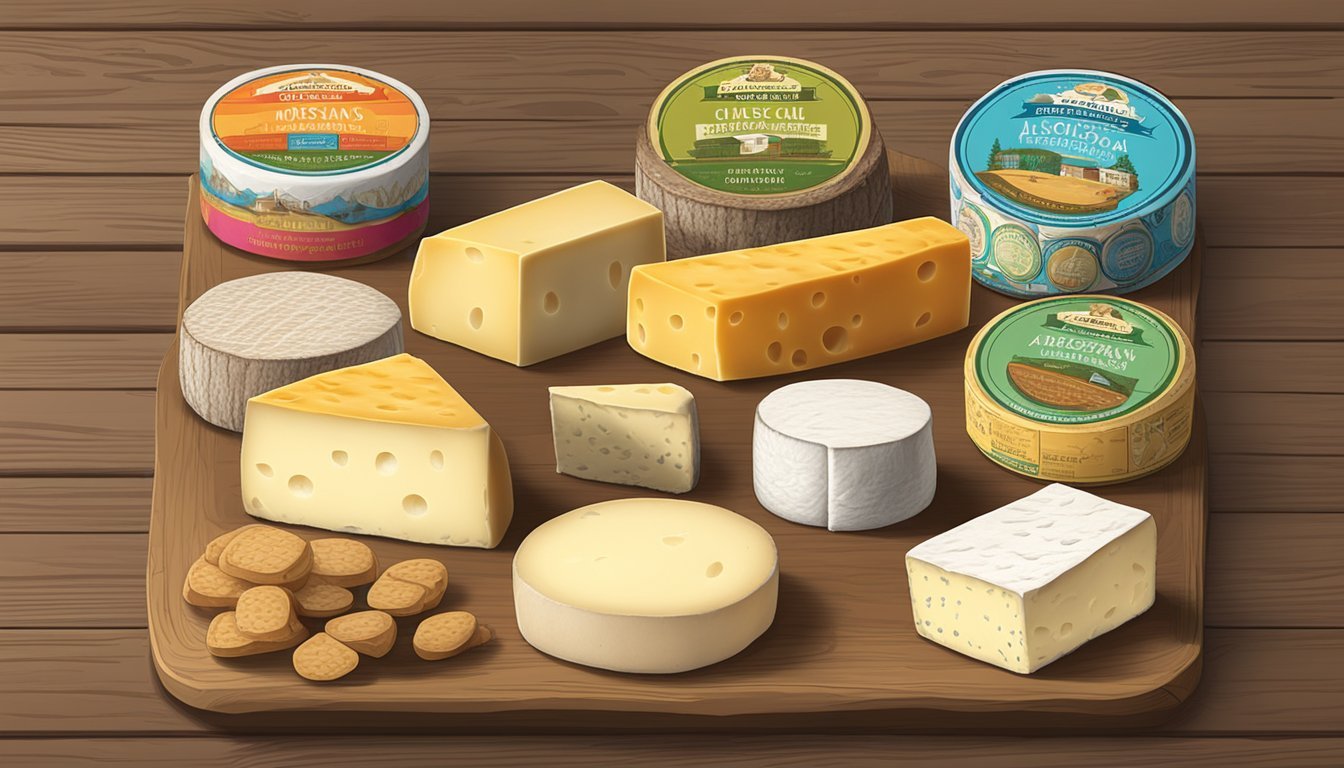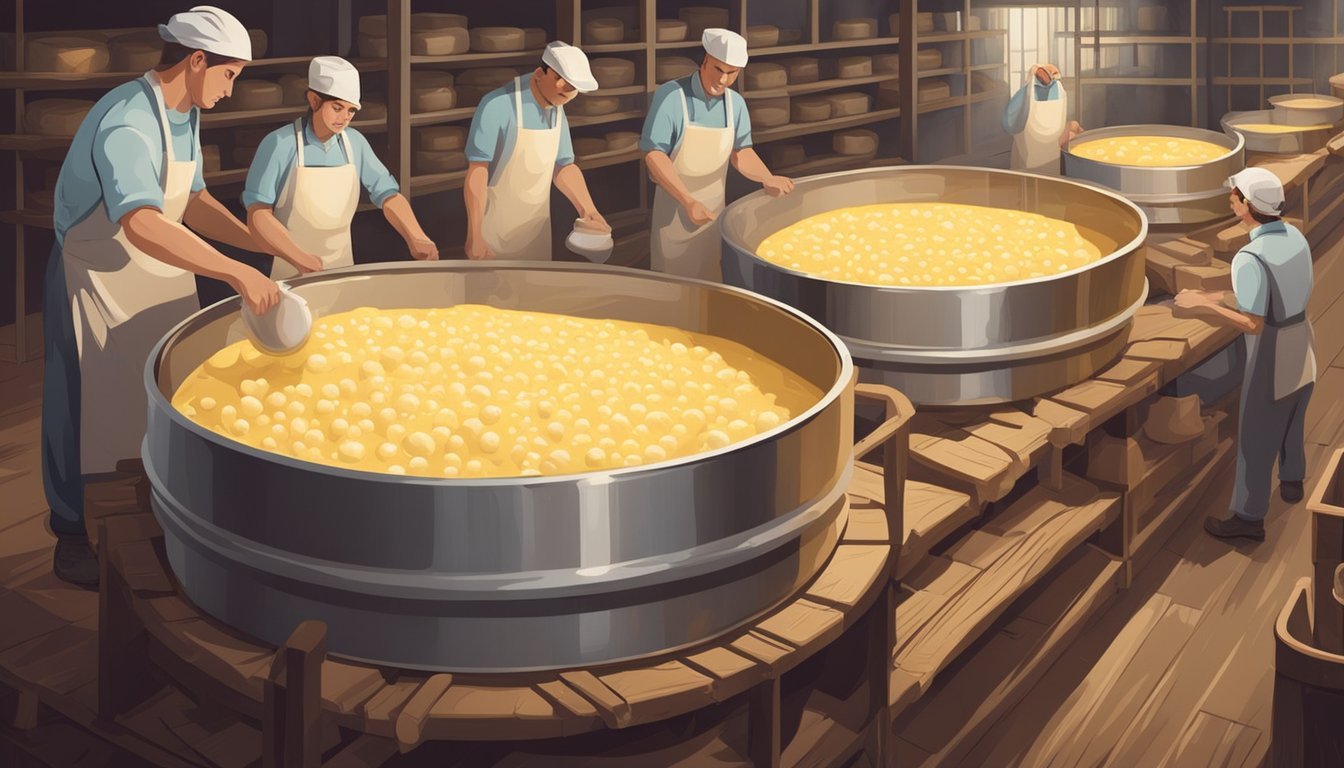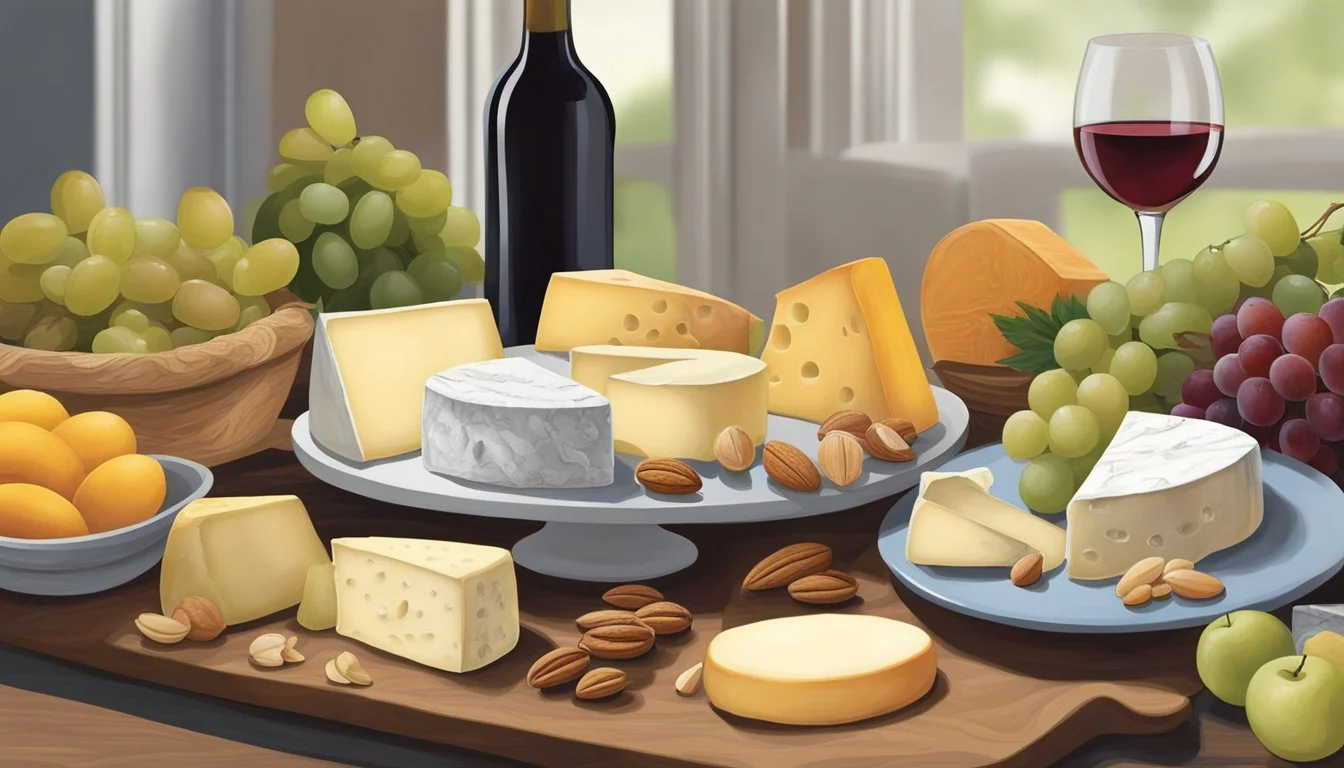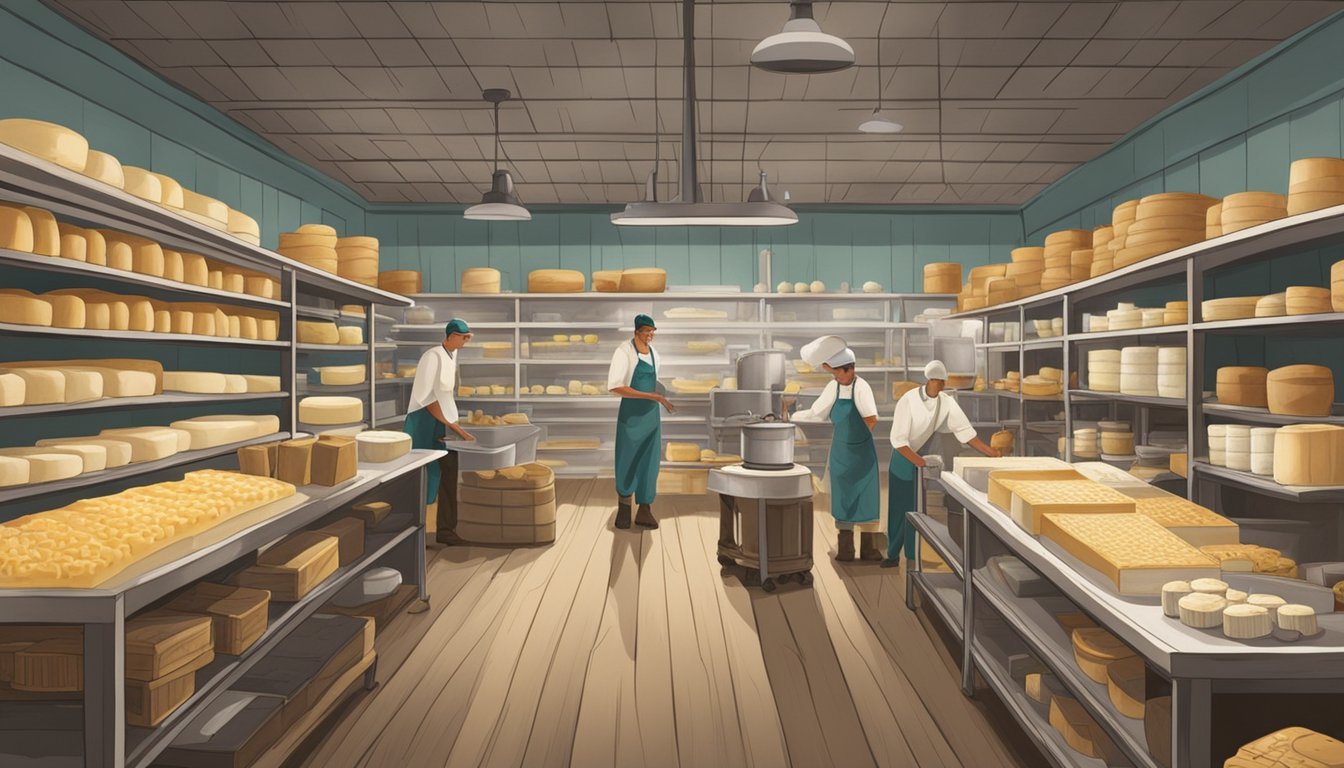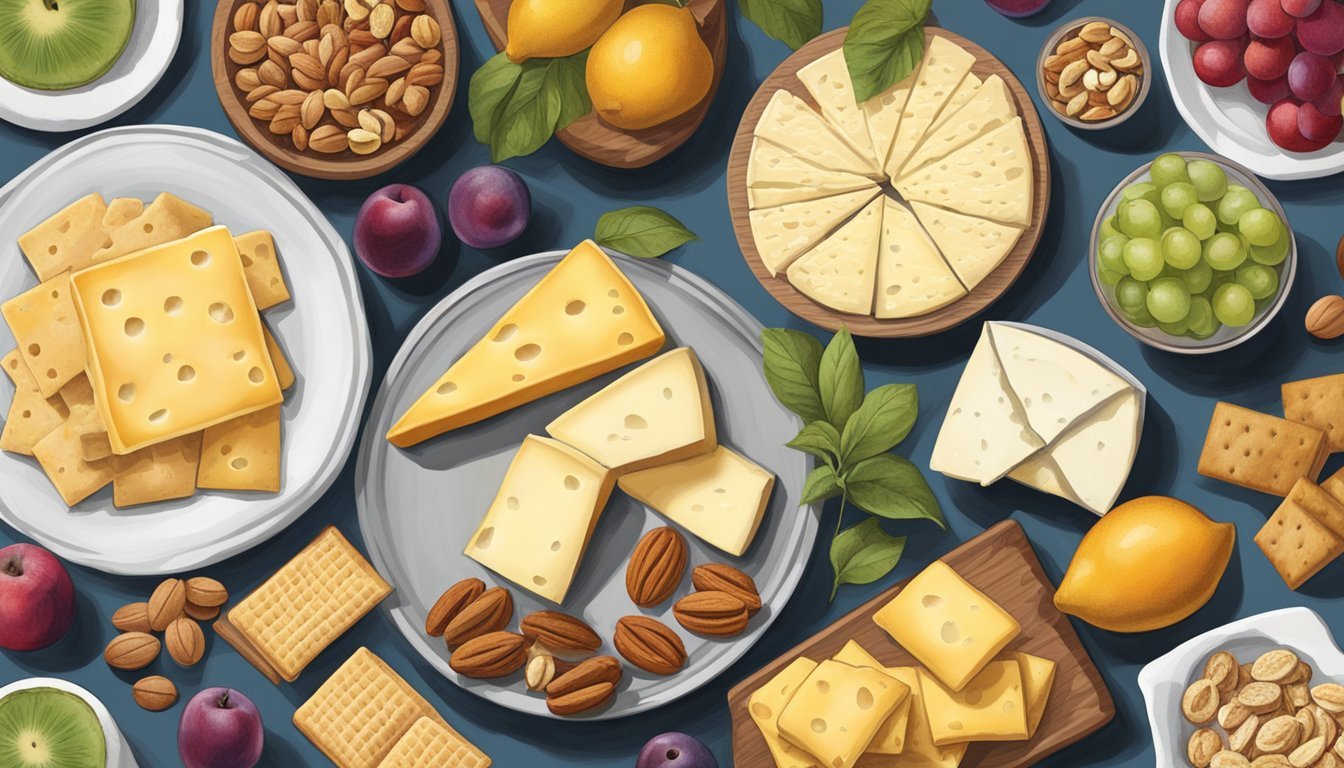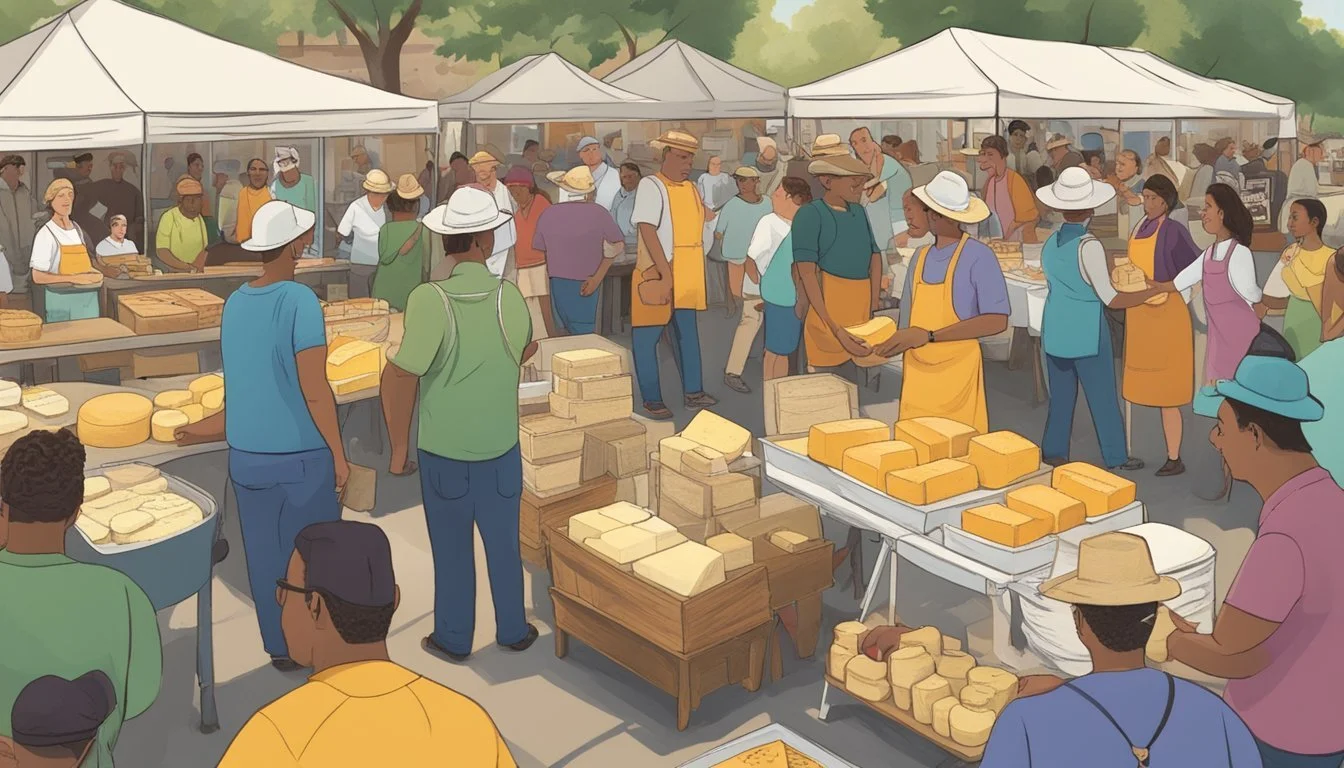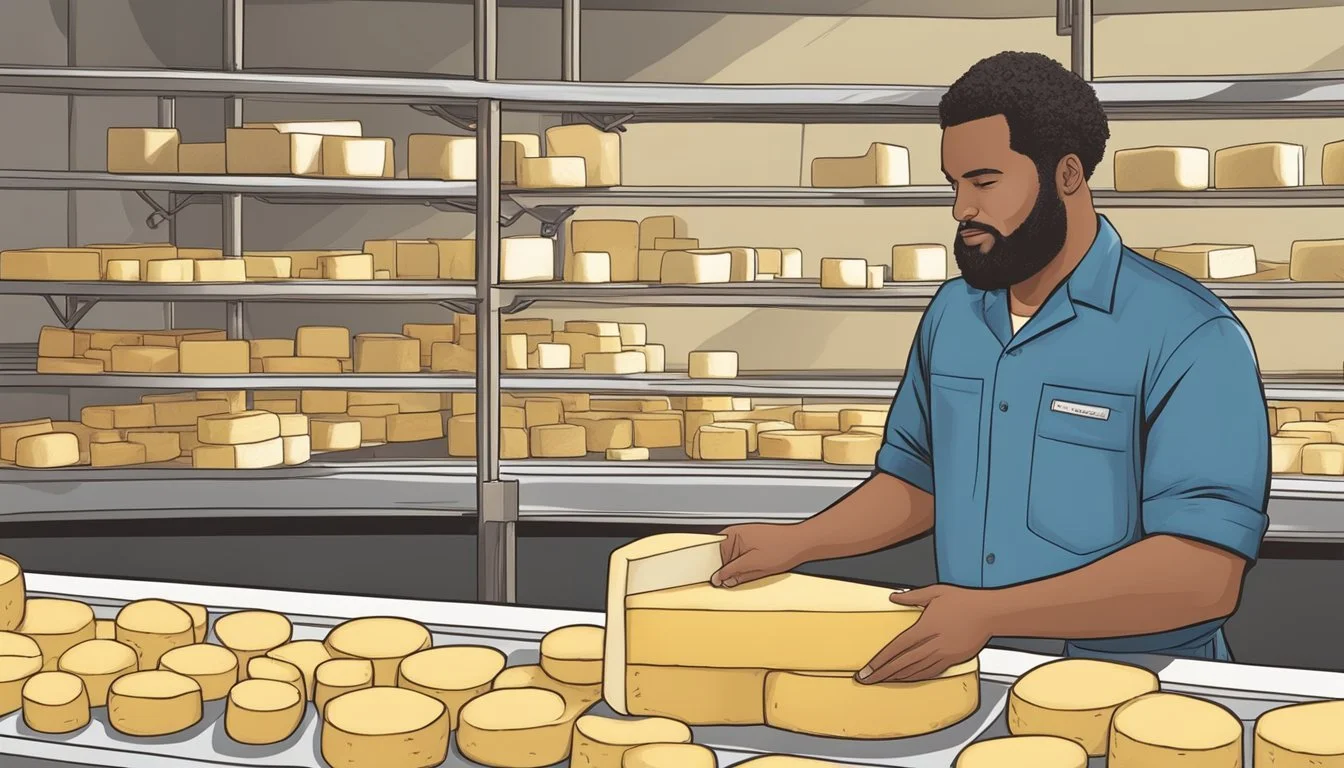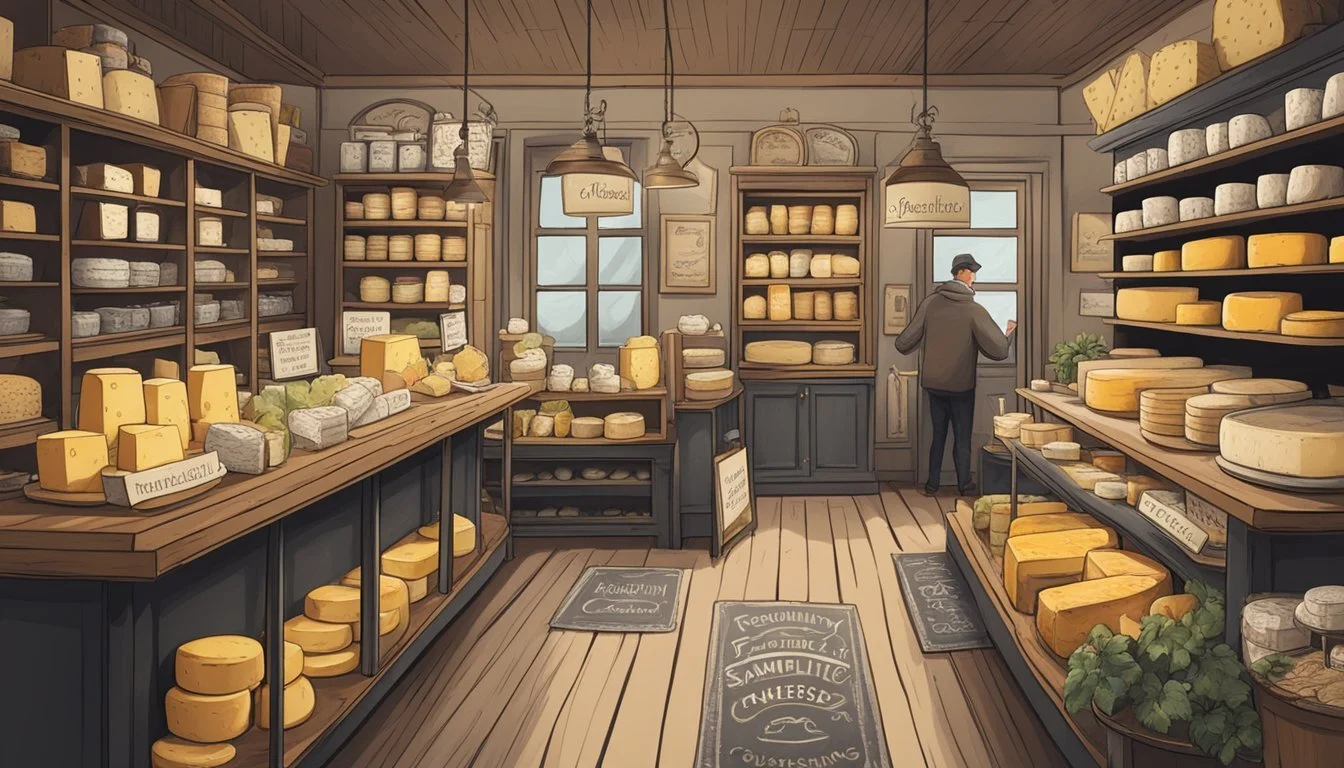Louisiana Artisan Cheese
A Guide to the Bayou State's Finest Cheeses
Louisiana's culinary landscape is as rich and diverse as its cultural heritage, and this extends to the state's thriving cheese (how long does cheese last?)-making industry. Artisan cheese (What wine goes well with cheese?) in Louisiana is not just a product; it embodies the state's passion for food and its history. The local artisans blend time-honored traditions with innovative techniques to create cheeses that are truly unique to the region. With an emphasis on quality and craftsmanship, these cheese makers produce an array of products that reflect the local flavors and the melting pot of cultures that is Louisiana.
In the world of Louisiana artisan cheeses, one can find a variety made from different milks, including cow, goat, and sheep, often sourced from the producer's own herd or nearby farms to ensure freshness and quality. The commitment to creating farmstead cheeses plays a significant role in the state's cheese culture, distinguishing it from more commercial dairy practices. By maintaining control over every step of the production process, from milking to aging, Louisiana's cheese artisans ensure that each wheel of cheese delivers a taste experience that is authentic and rooted in the state's traditions.
Bittersweet Plantation Dairy has been a noteworthy contributor to Louisiana's artisan cheese scene, creating specialty cheeses such as fresh chèvre and Creole cream cheese (how long does cream cheese last?), which celebrate the state's culinary influences from the seven nations that shaped the Cajun and Creole cultures. These cheeses, amongst others, are celebrated for their ability to complement the flavors in Louisiana's iconic dishes, demonstrating how artisan cheeses from the region are not just an accompaniment but an integral component of the gastronomic landscape.
History of Louisiana Artisan Cheese
Louisiana’s artisan cheese history intertwines traditional methods with rich local cultures, epitomized by Creole and Cajun influences.
Origins and Traditional Varieties
The origins of Louisiana artisan cheese are intricately linked to the arrival of French-speaking Acadians from Nova Scotia in the 18th century. These settlers brought with them time-honored cheese-making techniques, which they adapted to the local climate and ingredients. Traditional varieties often included simplistic, fresh cheeses (What wine goes well with fresh cheeses?) that suited the agrarian lifestyle of these early communities.
Influence of Creole and Cajun Cultures
As Acadians became part of the melting pot that included Spanish Governor Don Bernardo de Gálvez's rule, they influenced what would become the Creole and Cajun cultures. These cultures took the basic cheese-making practices and infused them with the flavors and fervor of Louisiana. Cheeses began to take on unique local characteristics, blending European techniques with the spices and spirit of Creole and Cajun cuisines.
Types of Louisiana Artisan Cheeses
Louisiana boasts a diverse array of artisan cheeses, crafted utilizing locally-sourced milk to create varieties that embody the state's rich culinary heritage.
Cow's Milk Cheese Varieties
Louisiana's cow's milk cheeses (What wine goes well with cow's milk cheeses?) reflect a European influence with an American twist. The Holy Cow - Vache Santé, a term that playfully translates to "Healthy Cow," is a prime example. It's a cheese that embodies creamy textures and subtle flavors, often handcrafted to ensure quality. Another notable cow's milk cheese is the Bayou Blue, offering a bold, earthy profile reminiscent of traditional blue cheeses (What wine goes well with blue cheeses?) with a Southern flair.
Goat's Milk Cheese Varieties
The state's goat's milk cheeses, such as the Feliciana Nevat, provide a unique taste that distinguishes them from their cow's milk counterparts. This particular cheese is known for its delicate rind and creamy interior, often drawing from the milk of a local breed of goats like Nubian and La Mancha. Goat's milk cheese is celebrated for its tangy and slightly tart profile, making it a favorite for those looking for an artisanal cheese with a distinct character.
Unique Regional Cheeses
Among the cheeses unique to Louisiana is the Creole Cream Cheese, a traditional favorite that’s customarily enjoyed with fresh fruit or bread. Its texture is similar to cottage cheese (how long does cottage cheese last?)but with a richer, more buttery flavor profile, showcasing the unique culinary traditions of the region. Similarly, the Catalonian Nevat— named after the Spanish region known for its cheese — offers hints of Louisiana's diverse cultural influences, blending local taste preferences with international cheese-making traditions.
Cheese Production Process
The cheese production process in Louisiana artisan cheese making is both a science and an art, beginning with the careful selection of milk and following a journey of precise steps to produce cheeses with distinct flavors and textures.
From Farm to Creamery
At the start, local dairies provide fresh, usually pasteurized milk which can be whole or skim milk, depending on the desired cheese variety. Initially, the milk is often pasteurized to eliminate any harmful bacteria and to ensure consistency in the cheese-making process. Quality ingredients are paramount, as they significantly affect the taste and texture of the final product. The milk is then transported to the creamery, where the transformation begins.
To initiate the cheese-making process, beneficial bacteria, or cultures, are added to the milk to change lactose into lactic acid. This step is crucial as it influences the final flavor and texture of the cheese. Depending on the type of cheese being produced, rennet is then added to coagulate the milk. This enzyme causes milk to transform from a liquid to a solid or semi-solid state, forming curds and whey. The curds, which are clumps of the milk protein casein, are then cut into uniformly sized pieces to allow whey separation and curd maturation.
Ingredient Purpose in Cheese Making Milk (Whole or Skim) Base of the cheese Cultures Ferment lactose into lactic acid, develop flavors Rennet Coagulate milk, forming curds
Aging and Maturation
Once the curds are formed, pressed, and shaped, the aging process begins. Aging and maturation are critical steps where the cheese develops its unique flavor profiles and textural characteristics. The environment in which cheese ages – often referred to as the aging room or cave – is carefully controlled for temperature and humidity to cater to different cheese types.
Louisiana artisan cheeses may be aged for several weeks to several years. During this time, cheeses are regularly monitored and turned to ensure even maturation. Some may develop rinds or involve the introduction of specific molds that contribute to the flavor and appearance of the final product.
The art of aging is where time allows the complex interplay of enzymes and bacterial cultures to enhance the cheese's depth of flavor and desired texture. The dedicated attention to detail throughout the aging process epitomizes the craftsmanship of Louisiana's artisan cheesemakers.
Flavors and Pairings
Louisiana's artisan cheeses are celebrated for their rich flavors that reflect the local terroir and offer a delightful culinary journey. This section focuses on the intricate flavors characterizing these cheeses and suggests thoughtfully crafted pairing ideas that accentuate their taste profiles.
Describing Artisan Cheese Flavors
Louisiana artisan cheeses range in flavor from the tangy zest of a young goat chèvre to the deep, smoky notes of an aged farmhouse cheese. The local cheesemakers, using traditional methods, often produce cheeses with flavor profiles that carry hints of the environment in which the dairy animals graze. For example, farmstead cheeses—made exclusively from the milk of Nubian and La Mancha goats raised on-site—impart a subtle grassiness that is both refreshing and earthy.
Cheese Pairing Ideas
Appropriate pairings can highlight the intricate flavors of Louisiana's artisan cheeses. Here are some tailored suggestions:
Fruit Pairings: To complement the saltiness of a robust blue cheese, sweet fruits like figs or a drizzle of honey can be a perfect match. An acidic fruit like olives can pair well with mild cheeses, adding a briny contrast.
Breakfast Spread: A soft, creamy cheese can transform a breakfast dish when spread over crusty bread, optionally garnished with a hint of garlic for added zest.
Italian Inspired: Use freshly grated hard cheese over a savory Italian dish for a punch of umami flavor that pairs brilliantly with tomato-based sauces. (What wine goes well with tomato-based sauces?)
Seafood Complement: An artisan cheese with a milder flavor profile can be a suitable accompaniment to a seafood platter, enhancing but not overpowering the delicate taste of the fish.
Cheese Texture Pairing Suggestion Runny and Soft Crusty bread, sweet jam Crumbly Dried apricots (how long do dried apricots last?), figs Densely Hard Italian dishes, olives
Louisiana Cheesemakers and Creameries
Louisiana's cheesemaking heritage is enriched by a variety of artisan producers, each contributing unique flavors and traditions. From Bittersweet Plantation Dairy’s array of specialty cheeses to the farmstead Belle Ecorce cheeses, the state is ripe for exploring local creameries with gourmet offerings.
Notable Cheesemakers
Bittersweet Plantation Dairy stands out with its fine artisan cheeses, including Fresh Chevre, Creole Cream Cheese, and Blue Cheese. Their products cater to a range of tastes and are stocked at both retail and wholesale locations, reflecting the widespread appreciation for their handcrafted quality.
St. James Cheese Company, another prominent name in the Louisiana cheese scene, offers a selection of both domestic and imported artisan cheeses, fostering a culture of cheese excellence in the heart of New Orleans.
While not included in the search results, other cheesemakers such as Holy Cow, Vache Sante, and Cowgirl Creamery are notable in their own right. Although Cowgirl Creamery originates from California, its esteemed reputation as an artisan cheesemaker earns it mention alongside Louisiana's local gems.
Visiting Local Creameries
Visitors to local Louisiana creameries can expect a personal glimpse into the artisan cheesemaking process. Feliciana's Best Creamery, for example, is an independent family-owned dairy farm where guests can experience the care taken in producing fresh, non-homogenized milk—a crucial ingredient for high-quality cheese.
Creameries commonly offer tours, tasting sessions, and direct purchase opportunities, allowing cheese enthusiasts to support local businesses and enjoy products at their peak freshness.
By prioritizing a visit to Baton Rouge's Red Stick Farmers Market, cheese lovers can indulge in Belle Ecorce goat's milk cheeses, a testament to local craftsmanship and the region's robust dairy culture.
Serving and Enjoying
When it comes to Louisiana artisan cheese, presentation and pairing are everything. A proper display and the right accompaniments can elevate the cheese-tasting experience, whether it's part of a board or incorporated into a dish.
Creating the Perfect Cheese Board
A quintessential cheese board harmoniously blends textures and flavors. Begin with a selection of local artisan cheeses; for instance, a semi-soft, nutty-flavored Dutch Highland Artisanal Gouda or a subtly aged Bayou Blue can serve as excellent focal points. Accompany these with a mix of fresh and dried fruits, nuts (how long do nuts last?), and a variety of breads or artisanal crackers. For an authentic Louisiana touch, add some regional specialties like pickled okra or pepper jelly. Remember to serve the cheese at room temperature to accentuate its flavors and aromas.
Incorporating Cheese into Meals
Louisiana artisan cheeses can dramatically transform a meal. A two-year aged Cheddar can be the star of the best-grilled cheese sandwich, especially when paired with the perfect sourdough bread, achieving the optimal melt and crunch. In upscale restaurants, chefs might use these cheeses to add a layer of complexity to classic dishes. For instance, an exquisite oyster bisque can be enriched with a hint of Bayou Blue, adding depth to the flavor profile. Furthermore, a buttermilk onion tart becomes a showcase dish when enhanced with a local farmstead goat cheese, delivering a satisfying balance of tang and sweetness.
Cheese in Louisiana Culture
Louisiana's cheese culture is a vibrant element of its social and culinary traditions, reflecting the state’s Cajun and Creole influences and playing a significant role in events and local cuisine.
Cheese at Social Events
In Louisiana, cheese serves as a cornerstone for many social gatherings. Mardi Gras, the iconic celebration leading up to Lent, often features a bounty of local fare, including artisan cheeses that add a gourmet touch to the festivities. Parties and parades provide the perfect backdrop for showcasing Louisiana's cheese-making craftsmanship, with varieties like the creamy Belle Ecorce and the robust Jolie Blonde often taking center stage.
Entertainment Events: Here, cheese is more than just food; it's part of the entertainment, rich with local flavor and flair.
Festivals and Markets: Attendees at various markets, such as the Saturday market mentioned in the search results, can often find these treasures of the dairy world.
Cheese in Louisiana Cuisine
Cajun and Creole cuisines heavily feature dairy, with cheese playing a substantial role in adding depth and flavor to dishes. Cheese is intricately woven into the fabric of Louisiana's food identity, enriching a myriad of recipes.
Cajun Classics: Cajun dishes, known for their bold flavors, frequently incorporate cheese to balance spice and complexity.
Creole Cooking: With a more subtle approach, Creole recipes utilize cheese as a key ingredient that complements the delicate fusion of cultures in Louisiana’s culinary landscape.
Cheeses like the peppered Cheny add a piquant punch to dishes, while the inclusion of local specialties such as hog's head cheese in certain recipes showcases the state's culinary craftsmanship and innovation.
Shopping and Storage
In Louisiana, artisan cheese shopping and storage are key to maintaining the quality and flavor of cheese. Visitors and locals have access to select cheese shops specializing in regional and international cheeses, with particular attention to proper storage practices that enhance the cheese experience.
Finding Artisan Cheese in Retail
In Louisiana, artisan cheese enthusiasts can explore specialty cheese shops such as St. James Cheese Company, which offers an extensive range of local and international cheeses. With locations in New Orleans, both uptown at 5004 Prytania Street and in the Central Business District (CBD) at 641 Tchoupitoulas Street, St. James makes it convenient for cheese lovers to find exquisite varieties for any occasion. For those outside the city, retail options may include farmers' markets and local gourmet stores that also stock a selection of artisanal cheeses, ensuring that customers enjoy access to premium cheese regardless of their location.
Proper Cheese Storage
The longevity and taste of artisan cheese rely heavily on its storage. Cheese should be kept in a cool, humid environment to preserve its quality—ideally in a Cheese Grotto™ or a cheese cave if available. These storage solutions mimic the conditions of traditional aging cellars and can be a worthy investment for connoisseurs. If unavailable, the refrigerator can serve as an alternative storage space, provided that:
The refrigerator maintains consistent temperatures between 35°F and 45°F.
Cheese is wrapped in cheese paper, wax paper, or parchment, allowing it to breathe while maintaining humidity.
Harder cheeses are stored in the lower humidity area of the fridge, while softer cheeses require higher humidity.
Cheese is inspected regularly for any signs of spoilage or unwanted mold growth, and surfaces are cleaned if necessary.
By adhering to these steps, cheese retains its optimal flavors and textures, making every purchase a worthwhile addition to the kitchen.
Economic Impact
Louisiana's artisan cheese industry has a tangible effect on the state's economy, notably through localized market dynamics and by enriching the tourism sector.
Local Market and Sales
The local market for artisan cheese in Louisiana is anchored by cities like Baton Rouge and New Orleans, where culinary diversity thrives and local products are in demand. Sales of artisan cheeses contribute to the state’s agricultural cash receipts by appealing to both residents and visitors seeking authentic local flavors. Specialty cheese producers often engage in direct sales through farmers' markets, local groceries, and gourmet stores, keeping the economic benefits within the community.
Contribution to Tourism
Artisan cheese also plays a role in Louisiana's tourism, particularly in regions known for their gastronomic culture. Tour operators and local businesses include cheese tastings and creamery tours as part of the broader draw of the state's food tourism. Visitors attracted to the culinary diversity add to the industry's economic impact through their purchases, dining experiences, and attendance at food festivals that celebrate regional cheese varieties and pairings.
Community and Education
In Louisiana, the artisan cheese community thrives through educational workshops and the support of local cheesemakers. These initiatives not only foster a deeper understanding of cheesemaking but also kindle a sense of family among participants and producers.
Workshops and Tastings
Workshops on cheesemaking in Louisiana provide hands-on experiences for individuals interested in learning the craft. They cover the essentials from milk selection to curd formation, addressing the science and art behind the cheese. Participants gain practical knowledge, which they can then apply to create their own varieties of cheese. Tastings often complement these educational sessions, offering a sensory experience and an understanding of flavor profiles characteristic to Louisiana's cheese.
Supporting Local Cheese Makers
The support for local cheesemakers is a key aspect of Louisiana’s artisan cheese scene. Family-run farms and groups are often highlighted in community events, with an emphasis on the benefits of farmstead cheeses—products made with milk from the farm's own herd. These local cheesemakers contribute to the state's economy and sustainability while enriching the culinary landscape. Education plays a central role in promoting these businesses, advocating for the appreciation and consumption of locally produced cheeses.
Legislation and Regulation
Louisiana's artisan cheese industry is subject to several regulations ensuring product safety and quality. These laws manage aspects ranging from pasteurization to appropriate labeling practices.
Safety Standards
In Louisiana, the safety standards for cheese production are closely monitored to ensure public health. Under state and federal regulations, cheese made from raw milk must follow strict aging processes to neutralize potential pathogens. These cheeses usually must be aged for 60 days or more at specific temperatures, although specifics can vary based on the type of cheese. Pasteurization is another critical safety measure, where milk is heated to a certain temperature for a set period to kill harmful bacteria. Producers must adhere to these guidelines to maintain their operating licenses.
Regulations also mandate the accurate labeling of products, including the use of ingredients like salt and sugar. Labels must clearly indicate these ingredients to inform consumers, especially those with dietary restrictions or health concerns.
Certifications and Awards
Certifications serve as a mark of quality and compliance with agricultural and food safety standards. The Louisiana Department of Agriculture and Forestry oversees these certifications, ensuring that dairy producers meet the robust criteria set out by state laws and regulations.
Artisan cheese producers in Louisiana may also compete for various awards that serve as recognition of excellence. These awards acknowledge exceptional flavor, texture, and overall quality. Winning such accolades can significantly enhance the reputation of a cheese maker within the industry.
The Future of Louisiana Artisan Cheese
Louisiana's artisan cheese industry stands poised to reflect both the resilience post-Hurricane Katrina and the culinary innovation for which the state is famous. With chefs like John Besh championing local cuisine, the sector is expected to merge tradition with modern trends.
Innovation in Cheese Making
Artisan cheesemakers in Louisiana are embracing modern techniques and technological advancements that offer novel flavors and textures to cheese enthusiasts. They are experimenting with incorporating local ingredients, such as Cajun spices or Creole flavors, contributing to a unique cheese profile that can only be found in Louisiana. Following the impact of Hurricane Katrina, there has been a focus on sustainability and rebuilding stronger, more resilient production facilities.
Sustainable Practices: Post-Katrina rebuilding includes using energy-efficient systems and local resources to minimize ecological footprints.
New Flavors: Fusion of traditional methods with local culinary heritage, leading to unique cheese varieties.
Market Trends
The market for Louisiana artisan cheese is witnessing notable trends influencing both production and consumption. Amidst growing demand for specialty cheeses, consumers are increasingly seeking out products with a local identity, which Louisiana's cheesemakers are well-positioned to provide. Furthermore, there is a growing appreciation for artisanal foods in the culinary community, often highlighted in the menus of influential chefs like John Besh.
Locally Sourced: Cheeses that emphasize local milk and ingredients reflect consumer desire for traceability and authenticity.
Culinary Partnerships: Restaurants and chefs are partnering with local cheesemakers, serving as trendsetters and amplifying the reach of artisanal cheese products.
Frequently Asked Questions
What is Artisan Cheese?
Artisan cheese refers to cheeses produced by hand using traditional methods. They often come from small-scale producers and can be made from various types of milk, including cow, goat, sheep, and buffalo, each imparting unique flavors.
How Long Does Artisan Cheese Last?
An unopened artisan cheese is typically good for 2-4 weeks past the labeled date. Once opened and exposed to air, a thin film of natural mold may form on the surface. This mold can be trimmed away; it does not indicate spoilage.
What Types of Milk are Used?
Artisan cheeses can be crafted from:
Cow milk: Common and versatile
Goat milk: Distinctive tangy quality
Sheep milk: Rich and creamy
Buffalo milk: Unique and less common
How Do I Know if the Cheese is from a Specific Producer?
The packing list enclosed in the order usually includes the sender's address. This can indicate the origin if given as a gift or purchased directly from the producer.
Can I Attend Classes to Learn More?
One is welcome to join cheese-making classes. It is advisable to begin with beginner-level courses due to lower time investment and equipment needs.
Can I Gift Artisan Cheese?
Yes, one can gift artisan cheese. The sender's identity can be provided on the packing slip without listing prices, ensuring the recipient knows who to thank.
Are There Artisan Cheeses from Louisiana?
Yes, one can find artisan cheeses in Louisiana, such as those made by local farmstead cheese makers who sometimes produce award-winning cheeses.
About the Author
The author, a recognized food journalist with a focus on Southern cuisine, holds a significant reputation in the culinary writing community. With a background that includes a degree in Culinary Arts and a history of exploring regional food cultures, the author brings a wealth of knowledge to the topic of Louisiana artisan cheese.
Education & Experience:
B.A. in Culinary Arts
10 years of food journalism experience
Specialization in Southern food culture
Published Work:
Regular contributor to well-known culinary magazines
Author of two books on Southern cuisine and artisanal foods
Accolades:
Received the James Beard Foundation Award for Food Journalism
Recognized by the Southern Foodways Alliance for contributions to the preservation of Southern culinary heritage
In their exploration of Louisiana artisan cheese, the author has visited numerous local cheesemakers, gaining hands-on experience and insights into the cheesemaking process, the influence of Louisiana's culture on its cheese, and the state's burgeoning reputation in the artisanal cheese industry. This expertise ensures that the readers are provided with an authentic and clear perspective on the subject.



